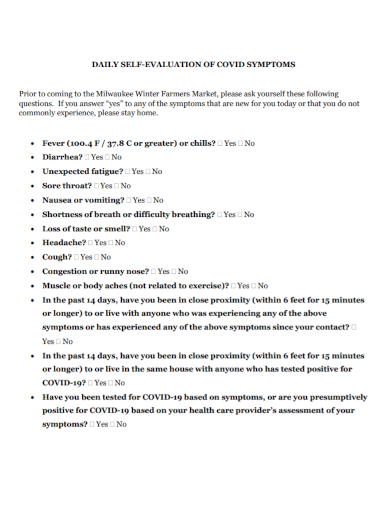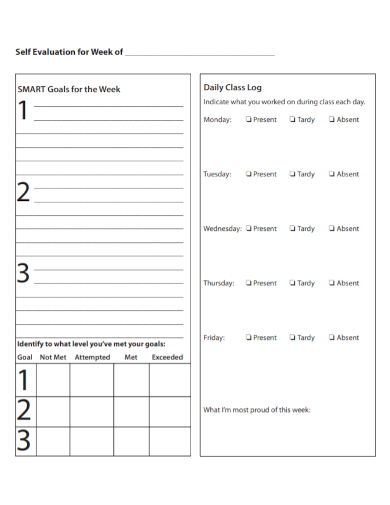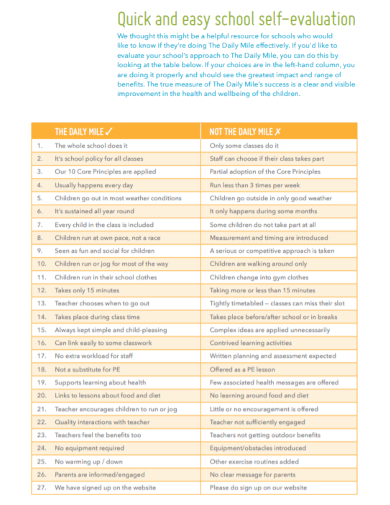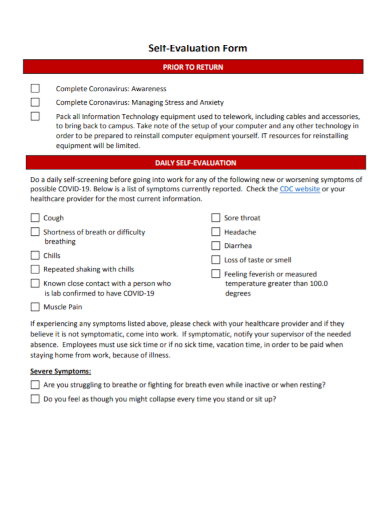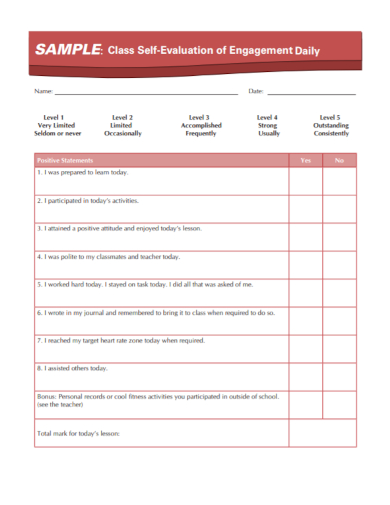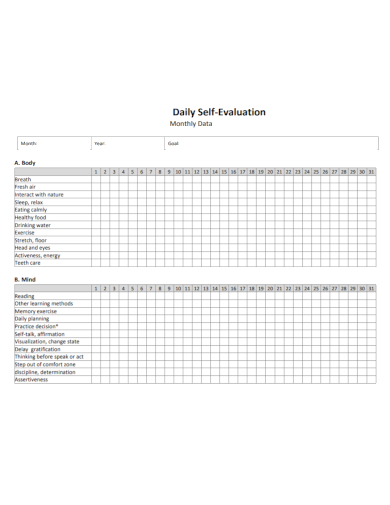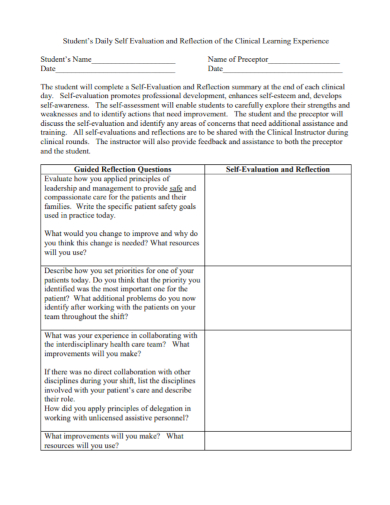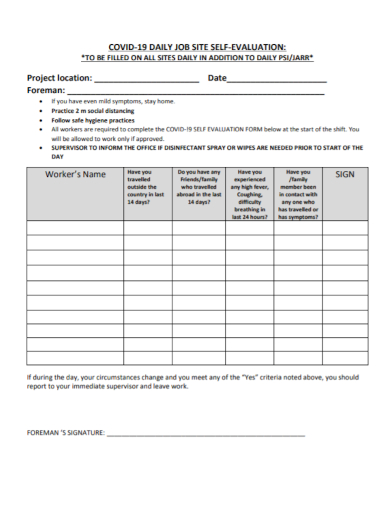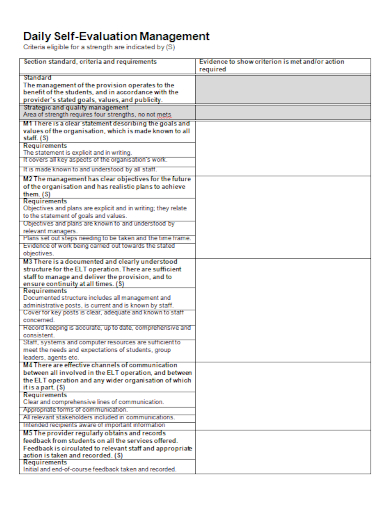“An authentic and genuine life grows like a sturdy tree. And like a tree, it grows slowly. Every time you make a different and better decision, it grows a little. Every time you choose to do the right thing, even when nobody would find out otherwise, it grows a little. Every time you act with compassion, relinquish your right to strike back, take a courageous stand, admit fault or accept responsibility, it grows a little.”
These wise words stated by Steve Goodier reminds us that personal growth will take place if you allow yourself to think, decide, and act on your own. But how can you further improve yourself than before? In this article, we provide you with some helpful steps and a wide array of sample daily self-evaluation forms so that you can continue on growing like a flourishing tree. Keep on reading!
8+ Daily Self-Evaluation Samples
1. Covid Symptoms Daily Self-Evaluation
2. Daily Class Log Self-Evaluation
3. Daily School Self-Evaluation
4. Daily Self-Evaluation Form
5. Daily Class Engagement Self-Evaluation
6. Daily Health Self-Evaluation
7. Student Daily Self-Evaluation
8. Daily Job Site Self-Evaluation
9. Daily Management Self-Evaluation
What is a Daily Self-Evaluation?
A daily self-evaluation is a useful written form which helps a person in determining his or her personal strengths and weaknesses, achievements and milestones, especially when it comes to advancing their current skills more and unlocking some valuable life skills. It can also guide a person in setting up crucial decisions in his or her life such as in education, career and employment, family, relationships, personal health and well-being, and many more.
How to Write a Daily Self-Evaluation
James Russell Lowell said: “No one can produce great things who is not thoroughly sincere in dealing with himself.” Thus, you only allow self-evaluation when you try to know yourself: your strengths and weaknesses, your interests and opportunities, and many other aspects about yourself. This will enable you to set a course for where you want to go.
In this section, we highly suggest that you use our free self-evaluation templates above that you can use conveniently. Here are the steps that work after you download your chosen daily self-evaluation template:
1. Conduct a self-assessment
To conduct a self assessment, identify where you were in your past, where you are in the current time, and where you will be in the near future. Moreover, you need to use these questions and ask yourself: What is my dream? What are my priorities in life? What are my key skills and strengths? What are my goals for self-evaluation? These aspects will help you to improve your skills and overall character.
2. Examine your current interests, personality, and daily accomplishments
One of the integral aspects in making your daily self-evaluation is examining your current interests so that you are able to choose the appropriate occupation or career, stream of study, subject area, or college to search for and you may want to aim for. Ask yourself: What are the specific things that I take pleasure in? Also, notice how you interact with different people around you. How do you come up with your personal decisions? These fundamental factors will help you to reflect and analyze different aspects of your personality, attitude, and behavior. Plus, record your daily accomplishments whether they are big or small.
3. Identify your core skills, values, and beliefs
Next, identify your core skills or abilities and strengths that you attained through miscellaneous activities such as school, secular work, extracurricular and volunteer experiences, and hobbies. Be mindful about the significant skills that you perform effectively. Then, know about your personal life values and beliefs like discovering what are your primary concerns in your life.
5. Meditate and reflect on the areas you need to change
Concentrate on the things you lack or simply, your weaknesses or some areas that you are struggling to achieve with. Take some time to meditate on them and reflect on how you will take some imperative measures to grow these skills and change your approach so that you will have progress in your performance.
FAQs
Some examples of areas of improvement for employees are cooperation, customer service, interpersonal communication, organization, time management, listening, written communication, patience, focus, trust, sympathy, leadership, judgment, honesty, and many more.What are some examples of areas of improvement?
A teacher can make a self-evaluation by monitoring his or her method of teaching. After each class, teachers should work on a short self evaluation form and check if they reached their prioritized goals and objectives. Then, make an evaluation of the good and the prospective factors that need to be improved next time.How can a teacher make a self-evaluation?
There are common assessment methods that you can do such as using open-ended questions to help your students in writing or talking, asking them self-reflective questions, asking them to summarize, using response cards, using analogy prompt, etc.What are the common assessment methods that you can do?
The core elements that should be included in a self-assessment performance review are specific tasks and projects that highlight your notable achievements. Explain how your achievements boost the image and value of the company or organization you’re being affiliated with. What are the core elements that should be included in a self-assessment performance review?
John C. Maxwell wrote in his book entitled “The 15 Invaluable Laws of Growth: Live Them and Reach Your Potential” that it is very important that you have to know who you are to grow to your potential. But you have to grow in order to know who you are. So, begin to pay attention to your passions, to accept who you are before you can start building as you get your daily self-evaluation checklist template today. Be inspired from Stephen Covey’s words: “How different our lives are when we really know what is deeply important to us, and keeping that picture in mind, we manage ourselves each day to be and to know what matters most.”
Related Posts
FREE 38+ Assessment Forms
FREE 21+ Employee Evaluation Form Samples
FREE 19+ Sample Marketing Report
FREE 19+ Employee Evaluation Form Samples
FREE 13+ Tutor Log Samples
FREE 9+ Work Evaluation Form Samples
FREE 9+ Sample Employee Evaluation Forms
Importance of an Employee Evaluation
FREE 9+ Sample Employee Uniform Forms
FREE 9+ Sample Teaching Evaluation Forms
FREE 54+ Questionnaire Samples
FREE 36+ Report Templates
FREE 21+ Sample School Reports
FREE 15+ School Checklist Samples
FREE 11+ Teaching Evaluation Form Samples

